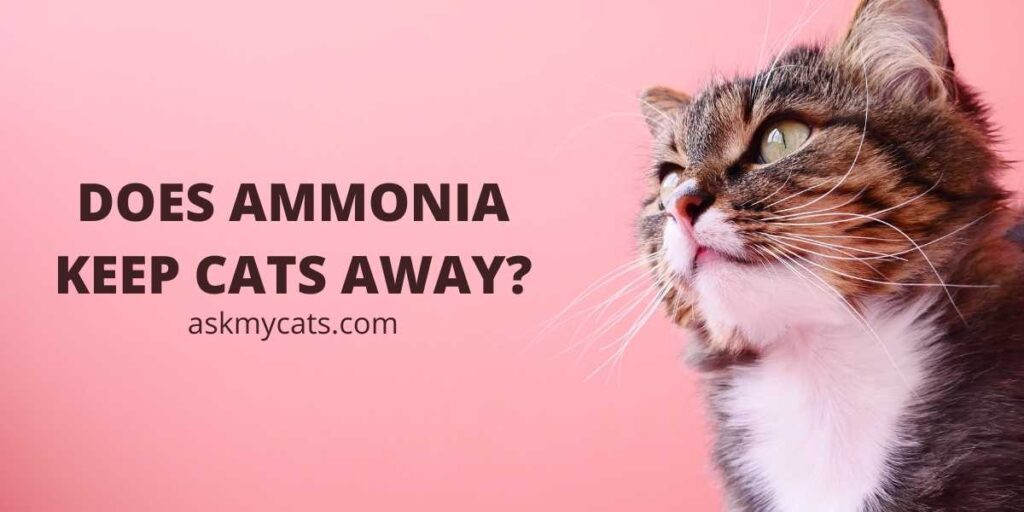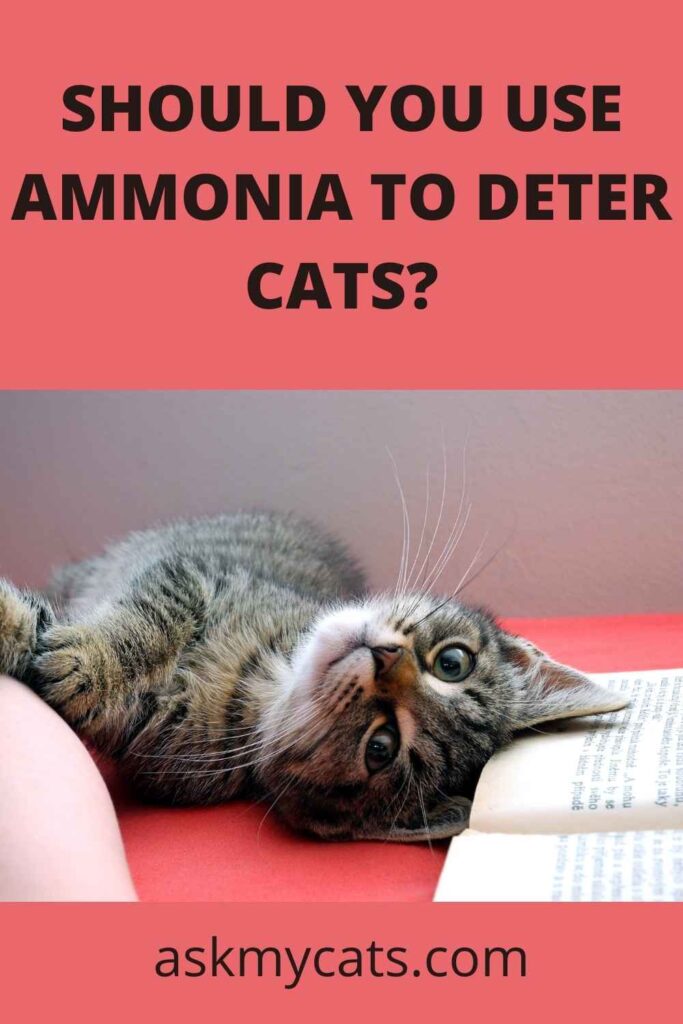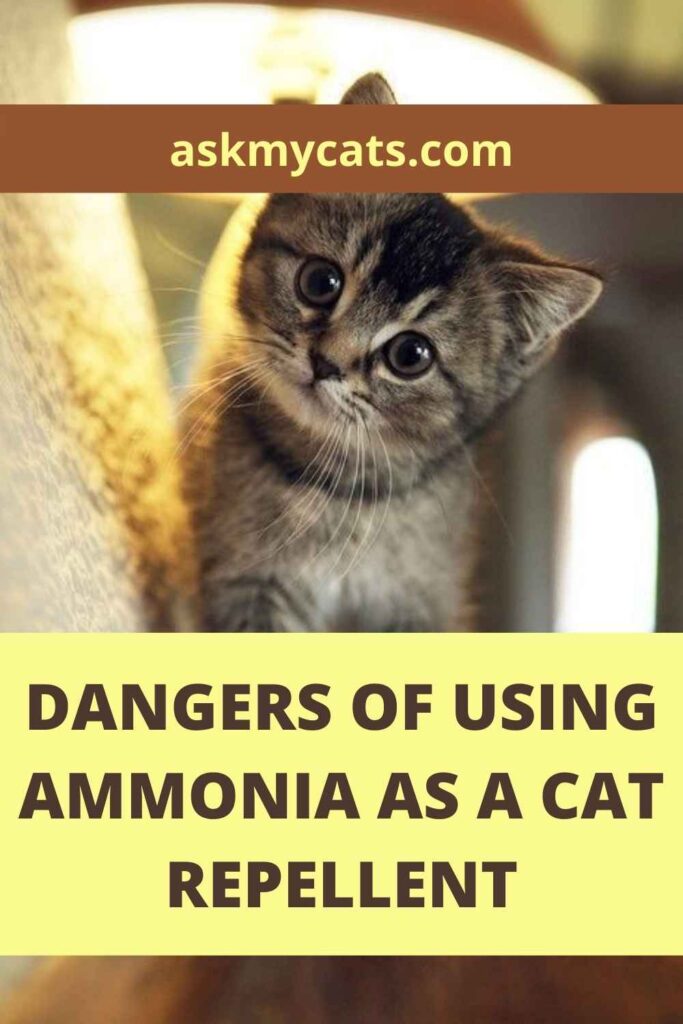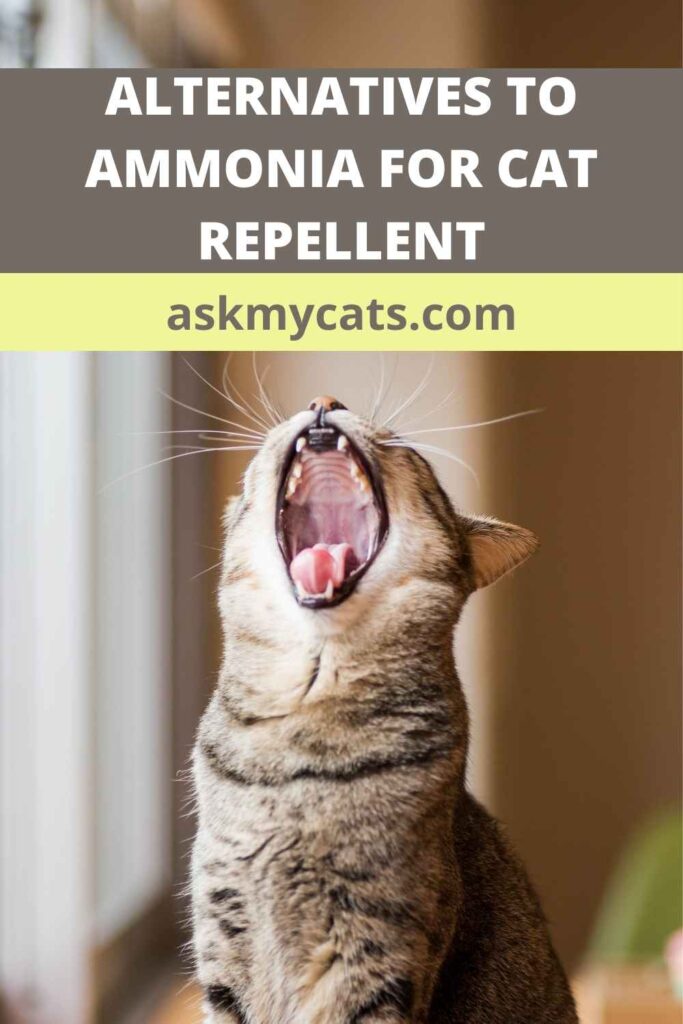While cats are almost always a cute and welcome presence, they tend to overstay their welcome once they start leaving behind poop, dead rodents, or urine in your backyard, lawn, or porch.
At such times, you may start wanting to figure out ways to keep these neighborhood feral cats away from your porch and backyard.
While coming across many DIY cat repellents, you may also come across the suggestion of using ammonia among many other substances like vinegar, black pepper, cayenne pepper, or even bleach.
However, some of these ingredients, like bleach and ammonia, while good deterrents, should be a big no in your list of DIY cat repellents.
This is because these substances are not a humane way of keeping the cats away. They may harm the health of the neighborhood cats in many ways – and that is not what we want.
We just want to keep these cats away from our lawns and backyards, and there are many safe, effective, and cruelty-free ways to do so.
In this article, we will look at the potential dangers of using ammonia as a cat repellent and we will also see what are some cruelty-free and effective ways of keeping the neighborhood cats away.


Give Your Cat the Perfect Day
Get the Free Ebook!
Does Ammonia Get Rid Of Cats?
In a word, yes. Ammonia does get rid of cats – but only sometimes.
The problem with using ammonia is that even cat urine itself has ammonia as one of the major contents of the chemical composition of urine. This makes cat urine smell like ammonia.
So, using ammonia to deter cats may sometimes work by confusing the incoming cats and throwing them off by making them feel that this is some other cat’s territory. This will however only work on the non-alpha felines.
For the alpha cats, however, using ammonia as a cat repellent may turn out to be counterproductive. That is because the incoming alpha cat may try to mask that smell with its own urine.
So, ammonia as a cat repellent may actually end up increasing the instances of neighborhood cat urination on your porch, lawn, or backyard.
Also, check out Does Black Pepper Keep Cats Away?
Is Ammonia Harmful For Cats?
Yes, ammonia is very harmful and toxic for cats. In fact, in case of an accidentally large dose, ammonia can even kill cats!
To gauge the dangers of ammonia, simply consider this: check the labels of all the cleaners you use.
Most cleaners come with a warning that says the cleaner contains ammonia and should not be inhaled or mixed with any other products because inhaling ammonia can be toxic even to humans!
In animals too, inhalation of ammonia has many toxic effects. It can cause respiratory problems that may be irreversible. It may even cause the cat to pass away due to asphyxiation or suffocation.
It can also cause other health problems such as burns on the skin or paws of the cats, or the fumes may cause a burning sensation in their eyes.
Is it true or myth: Will Cayenne Pepper Keep Cats Away?
Is Ammonia Safe To Use In The Garden?
No, ammonia is not safe to use in the garden as well. Not only does ammonia cause harm to the health of cats, but it is also damaging to plants.
This makes ammonia a nearly pointless cat repellent to use – because the purpose of cat repellents is to keep the neighboring intruding cats away from your gardens so that they don’t dirty the lawn or damage the plants.
So, using ammonia is essentially nullifying the whole purpose of protecting the plants and the garden or lawn from being damaged.
Now, this may come as a little confusing for most – because ammonia is essentially a source of nitrogen, a substance that is essential for plants and soil. So, many people might think that ammonia would enrich the soil – but that’s not always the case.
Ammonia solution is acidic and unless you know the pH of your soil, the solution can damage the soil, and consequently your plants on the lawn.
If you use ammonia solution in your garden and notice that the leaves and roots are blackening or withering, it’s a clear sign that ammonia is causing more damage from its acidity than the good it might be doing by keeping the neighboring cats away.
Also, check out Does Bleach Keep Cats Away?
Should You Use Ammonia To Deter Cats?

It is recommended to use alternative cat repellents instead of ammonia as its drawbacks outweigh its benefits.
For starters, the smell of ammonia may make cats think that some other cat has visited that area.
In that case, you might end up with more male cats on your lawn than before using ammonia cat repellent – these male cats may try to urinate or spray in the spots where you have sprayed ammonia.
This means that the ammonia cat repellent may actually be counterproductive in certain cases.
Additionally, the other way an ammonia solution for a cat repellent may be counterproductive is by the damage that ammonia itself causes to the plants and the soil.
The main purpose of keeping stray cats away from lawns and gardens is because they can be a menace by pooping or urinating or otherwise damaging and uprooting the plants.
So, a cat repellent that damages the plants themselves will actually be nullifying the whole point of using a cat repellent in the first place.
Moreover, ammonia can cause great harm to the health of intruding cats. The purpose of a cat repellent must only be to keep the cats away – not to cause them any injury or health problems.
Lastly, ammonia fumes are not only harmful to cats but also to the health of humans. So, all in all, using ammonia will do more harm than good. Hence, it is recommended to not use ammonia to deter cats.
You might also like to read about Does Vinegar Keep Cats Away?
Dangers Of Using Ammonia As A Cat Repellent

1 – Health Issues To Cats
The fumes of the ammonia solution can be fatal to the health of cats. It can cause respiratory issues and even skin burns or digestive issues in case of accidental contact or ingestion of the spray.
2 – Health Issues To Humans
Handling ammonia solutions and inhaling excessive amounts of ammonia fumes can be harmful to humans as well.
3 – Damage To The Fauna Of The Lawn/Garden
Ammonia spray, when used directly on plants, may cause blackening of leaves and roots, increase the acidity levels of the soil, and even lead to plants dying.
4 – Increase The Case Of Spraying By Neighboring Cats
Ammonia spray may replicate the smell of a cat’s urine. This may cause some excessively territorial male cats to spray or urinate in the spots where you have applied the ammonia solution.
Check out more details about Do Moth Balls Keep Cats Away?
Alternatives To Ammonia For Cat Repellent

There are many natural alternatives available to use as a cat repellent instead of ammonia.
Here is a list of ingredients you can use to make cat repellents that are effective, safe, and cruelty-free.
- Vinegar
- Lemon juice or peels
- Lime juice or peels
- Orange juice or peels
- Lavender
- Garlic
- Thyme
- Rosemary
- Coffee Grounds
- Lemongrass
Other than herbs, you can also opt for other cruelty-free methods such as automated sprinklers.
Frequently Asked Questions
Is ammonia toxic for animals?
Yes, ammonia is toxic for all animals including cats and dogs. The fumes of ammonia can cause respiratory diseases in them and in severe cases, it may even lead to the death of the animals.
Will cats drink ammonia?
No, cats do not drink ammonia out of choice. However, they may accidentally ingest some ammonia solution – and that can lead to severe problems of the stomach, guts, and skin, and may even lead to death.
Final Words
While neighboring intruding cats can be a nuisance and a menace, using ammonia to repel or deter them is a cruel method that can cause harm to their health and even lead to death.
Thus, to keep the street cats away from your lawn, garden, or porch, opt for other safer, effective, and cruelty-free methods like vinegar, coffee grounds, etc.
Must Read: 5 Natural & Safe DIY Home Remedies to Keep Cats Away
